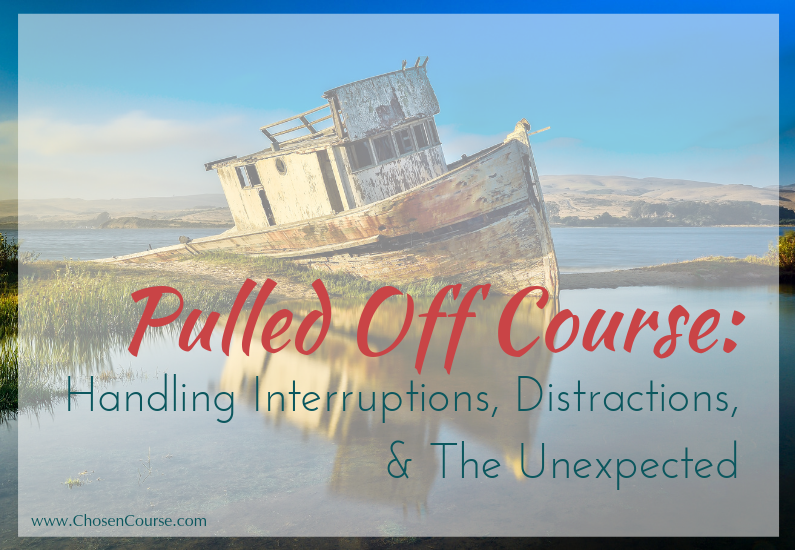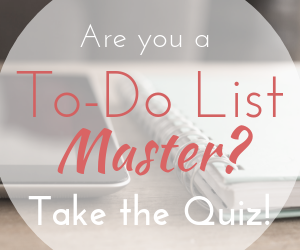We all have times when we get pulled off course. Yep, it happens to me too sometimes, but not as often as it used to and usually not for hours at a time.
However, even just this morning I noticed myself procrastinating by allowing myself to get distracted from starting my work. That’s why I decided that it was time for me to review chapter 29 of my book, Inspired Action, both for your sake and for my own. Fortunately, I think my procrastination lasted about 30 minutes, but I can remember when it used to last hours or even days.
I had a client tell me recently about spending four prime work hours researching desk chairs on Amazon for his upcoming visit to Australia. He recognized that this was a problem and not a good use of his time… which is why he brought it up during our session. Does that sound familiar? We’ve all done it. Fallen down the rabbit hole… making a 20-minute task turn into hours.
In actually, there are three different forces that can pull us off track from what we planned to do in a given day:
- Interruptions – External forces that stop the flow of our attention
- Distractions – Internal forces that lure your attention away
- Unexpected Events – Major or minor events that throw all plans off track (family emergencies, traffic accidents, national or global events like 9/11, etc.)
In this excerpted chapter from Inspired Action, I cover the role that these three elements play in ruining our productivity and how to build your skills to get yourself back on track when they do. So, let’s dive in…
Managing Interruptions and Distractions
Have you ever gotten to the end of your day and wondered, “What happened?!” I know I’ve had a few days like that in my life. Sometimes the off-kilter day was a matter of poor planning. Other times my energy simply didn’t match the tasks that I had planned to do. We all have days when our creative juices simply aren’t flowing, no matter how much we want to get that report done by next week.
Often, however, that “Where did my day go?” experience happens because we fail to check in with ourselves periodically to make sure that we are on track with the actions that we intended. We allow interruptions and distractions to win the day. It’s so easy to let that happen because life today is riddled with interruptions and distractions. Email dings, the telephone rings, a text message pings, and life suddenly zings past us with little attention paid to the plans that we made for the day.
This was a persistent problem for my client, Matt, an accountant and tax planner. He would plan to work on a big project and then start his day by turning on his email “just to see if anything important has come in.” Unfailingly, email would distract him for one to three hours of his prime thinking time. During that time, the phone would inevitably ring and interrupt the flow of his emailing. Often the phone call was a client or colleague with a question, and Matt would be off chasing this new issue. On other days, the call came from a client’s lawyer, who “needed” Matt to prepare financial information to be presented in court in two days. Matt would drop everything he’d planned to do—i.e., his big project work—and take care of this unexpected “urgent” priority.
Frequently, Matt would get to lunchtime without even touching his big project. Instead, he would spend prime morning hours reacting to everything (and everyone) else.
So, Matt would leave for lunch in a bit of a daze and remind himself that he needed to get down to work on the big project after lunch. Some days he would do just that for an hour or so until the midafternoon slump hit, his energy dropped, and the big project felt even bigger and more challenging—thus increasing his resistance to working on it and justifying various types of procrastination.
Does this story sound familiar? Shift a few details, and probably most of us have experienced days like this, when a dash of procrastination, a sprinkle of interruptions, some poor energy management, and a dose of adrenalin turn that productive day we planned into a stew of frustration, exhaustion, and confusion—certainly not my favorite meal.
To help you avoid or minimize this experience, I’m going to give you some tools to address the two sides of this problem: 1) handling interruptions, distractions, and unplanned events, and 2) structuring in check-ins and course corrections.
Handling Interruptions
Interruptions are an unavoidable part of life. Telephones, emails, co-workers, and kids jockey for our attention and aim to pull it away from whatever we planned to focus on. First, it’s important to acknowledge that interruptions dissipate our productive energy and thus are important to minimize. Second, it’s important to recognize that you have a choice to be drawn off course or to maintain your focus.
You choose to answer the phone, to check your email when it dings, or to respond to that text right now. Which means that you can also choose when it will be most productive for you to do so. The difference between a top-performing individual and someone who will perpetually scrape by is his or her ability to accept and wield that power of choice.
Exercising the power of choice is a learned skill that you can strengthen over time. But first, you can start by limiting the opportunities for interruptions in your life. For example, if you’re going to work on a big project, try any of the following:
- Turn off your phone’s ringer
- Silence the new-email and text notifications on your smartphone and computer
- Put a Do Not Disturb sign on your office door or cubical entrance
These actions will remove tempting interruptions entirely, which can be great for periods of intense work or creative action. However, eventually you will want to work on building your choice reflexes more directly rather than just eliminating the outside influence. Here are a couple ways to accomplish this goal:
- Get comfortable screening your phone calls. Choose which calls you really need to take and which ones can wait for later. Let the caller leave a voice mail, and then call back if it’s important.
- Build up your tolerance level for waiting to check email. If you check email as a knee-jerk response every time you turn on your smartphone or see an alert on your computer screen, then get used to seeing unread emails in your inbox and choosing to review and respond to them later.
Most of us (though unfortunately not all) are good about not interrupting meetings or quality time with friends and loved ones to attend to extraneous calls, texts, and emails. If this isn’t you, consider this your wake-up call! Which is more important: that email, text, or call, or the person sitting in front of you? One of the fastest ways to damage a relationship is to imply that this person matters less than the alerts on your smartphone. People deserve your full attention if you’ve committed to spending the time with them, and the current epidemic of partial presence in relationships needs to be addressed, starting with ourselves. Be present!
Managing Distractions
Distractions, while similar to interruptions, are internally driven. When you’re distracted, you have allowed your mind to wander to any shiny idea, object, or task that it wants rather than staying focused on the activity at hand. Sometimes distractions can be productive because your mind makes connections between ideas that perhaps were unclear before. However, more frequently distractions are simply your mind’s way of playing a procrastination and avoidance game with you.
Don’t get me wrong: I’ve procrastinated with the best of them, and I pulled plenty of all-nighters in college and grad school because I allowed various other things to pull me away from papers that I was supposed to be writing. However, I also know that one of the greatest assets of a top performer is his or her ability to turn on laser focus and dismiss the brain’s attempts to distract them from a task.
Julie Morgenstern has emphasized the single best change most of us can make to avoid distractions: never check email in the morning. By its very nature, email is a reactive task that pulls you away from your productive plan. Give today’s Inspired Action task precedence as the first thing you do each day, and don’t even open your email until afterward. You may be surprised at how great that simple change can feel. (For more information about choosing your Inspired Action “One Thing” each day, see Chapter 50: Daily Planning.)
As with the above suggestions for handling interruptions, you can work to build up your strength of choice regarding when you need to focus intensely and when some daydreaming—or, as psychologist Eric Maisel calls it, productive obsession—might be acceptable or appropriate.
Distractions can be harder to deal with than external interruptions since, after all, you can’t turn your brain on mute and expect to keep functioning. Nevertheless, managing distractions is a skill that can be learned and strengthened with exercise, so it’s worth deciding to develop it for yourself.
Navigating the Unexpected or Unplanned
Sometimes the universe simply has a different agenda for you today. You are on course and in flow, but you keep coming across unexpected obstacles: massive traffic jams, additional steps that you didn’t anticipate in your project planning, or major personal or global life events that steer you off course. If your child has an accident and goes to the hospital, your plan rightfully flies out the window. Similarly, major world events like 9/11 may understandably pull your attention away from the activities that you intended to accomplish.
In reality, there is little you can do about this type of interruption. It’s important to give yourself space and time to handle the immediate situations or emotions that arise, and when you are ready and have some space, you can consider how to regroup and move forward. These are times for patience, adaptability, and emotional resiliency to take their place for the day.
Structuring Check-in and Course Corrections
Most days don’t involve massive elements of the unexpected or unplanned. Instead, you’ll probably have your typical share of interruptions and distractions. One of the best ways to minimize their counterproductive impact is to build in regular check-in structures for your day. Here are some ways that you could do that:
- Set an alarm on your cell phone or computer that goes off in the midmorning and midafternoon. Use the alarm as a reminder to ask yourself, “Am I done with today’s Inspired Action task? Is what I’m doing right now the best use of my time and energy?”
- Use a mindfulness app that sounds a bell either each hour or at random, and ask the guiding questions above whenever it sounds.
- Plan a 5-to-10-minute meeting with yourself at the end of your lunch break to recalibrate your plan for the day based on the morning’s events and to focus on the best activities for you that afternoon.
Can you think of other check-ins or daily course-correction techniques that could help you get yourself back on task during the day? Maybe you can attach your new check-in technique to an established pattern, such as your midmorning coffee break, to help you remember to do it.
Becoming skilled at handling interruptions and distractions is no longer optional for living an effective, productive, and happy life. Whatever you can do to make it easier to build that skill is probably worth the effort.
Next Actions
- Look at your calendar for the next few days and identify a time when you will really need focused, creative energy. Practice reducing interruptions by removing common sources of interruption during that time. (Don’t forget to turn your phone back on or otherwise restore those sources when you’re done.)
- Practice screening your calls for the next week. Every time your phone rings, consciously ask yourself, “Is this the best time to have this conversation? Do I need to take this call?“
- Turn off the new-email notifications on your machines. I could become a broken record on this topic, but no one needs to be alerted every time a new spam message comes into your inbox.
- Establish one check-in or daily course-correction technique and try to maintain it for two to three weeks. Then reflect on it at the end of the test period. Did you get more important tasks done than usual? Did you feel better about how you managed your time? Do you want to make any universal adjustments to your planning or daily rhythms in order to avoid certain frequently encountered patterns? For instance, waiting to check your email until later in the morning, or prioritizing your Inspired Action task at the very beginning of your day.
- Strengthen your power of choice and focus through meditation. Learning to calm your mind not only can increase your productivity, but also can improve your overall health and well-being. Try sitting for just three minutes with your eyes closed. Focus on your inhales and exhales. Just three minutes of focus practice can strengthen that muscle significantly, and you can increase it slowly over time.
If this excerpt from Inspired Action has been helpful to you, then pick up a copy of the book today. It provides 50 short, actionable chapters that can help you connect with greater meaning and purpose and develop the productivity systems to put your purpose into action each day.




